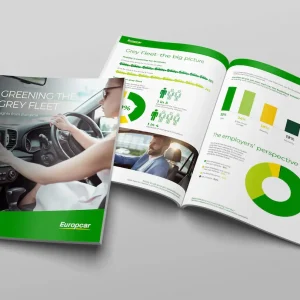Veteran industry readers may remember a lot of faxing between leasing companies and garages. Phone call tennis, reams of spreadsheets (still the norm for some fleets, but that’s another story) were just part of the job for booking a service or maintenance job.
Then came Epyx in 2000. Founded by a team of seven and led by then-managing director Greg Connell, the company’s aim was to do away with all the above and make it easier for leasing firms to transact with garages. It does that via its main product, the 1link Service Network, which became the go-to platform to facilitate fleet SMR work after its 2002 launch. Today, it is used by most of the UK’s biggest leasing firms, nearly all the major motor manufacturers via their franchised dealers, and no shortage of independent garages.
Epyx’s ubiquity means you do not need to be a fleet veteran to have crossed paths with it. That is partly because it claims to manage more than four million cars, but also because its products have mushroomed into realms beyond SMR. Branches that would follow the original platform include 1link Relicensing, which allows fleet managers to tax vehicles automatically, 1link Disposal Network for defleeting and remarketing, and 1link Hire Network for rental bookings – among others. Its growing product portfolio and industry-standard status led to an acquisition by industry goliath Fleetcor in 2014.
“If you speak to the customers, they know us as 1link,” quips Tim Meadows, who re-joined the firm as chief commercial officer last year. Meadows was Epyx’s director of account management between 2016 and 2020, before hopping over to r2c online (still within the Fleetcor camp) for a spell as managing director. A familiar face in fleet, he spent 11 years at Leaseplan, finishing as brand director for public sector automotive leasing, and did stints at Lombard, Custom Fleet, and Lex.
“We genuinely did break the back of the telephone and manual processes that were in place,” he explains, “the main thing businesses are looking to do is improve their efficiency. so we try to speed up that process. If you are a company car driver taking your vehicle to be serviced, the job can be approved instantaneously rather than having to wait for someone to answer a phone, etc. The turnaround time for a vehicle being in the garage can be a lot faster than it would ever have been under a manual process. The work is approved and completed and the vehicle is back on the road as quickly as possible.
“That has just increased as time becomes more and more expensive. Digitalising the processes for the leasing companies has become more prevalent over the years – whether it’s their quoting systems, or the way they interface with their drivers through apps. All of that fits in very nicely into 1link, because it’s people-free – if that makes sense – in terms of having to have people at each end doing the manual processes.”
It is a long time by any standards, but 23 years in business is practically an eon in tech circles, so the firm’s core focus of hooking up drivers with garages has naturally become more sophisticated. One of its more recent milestones was its Driver Booking Module – or DBM – which first appeared in late 2021 and is effectively an API (Application Programming Interface: intermediary software that allows two applications to talk to each other) for dealer management systems – the software that garages use to run their operations – shortened to DMS in the trade.
For non-tech whizzes, the DBM can talk to the calendar in the garage’s software and find out when it has available slots for service and repair work. Drivers using 1link can then pick a convenient day and time. If you have ever used Calendly to book a Zoom or a Teams call, it is a similar concept, and in its initial form, offered a choice of three potential booking slots. Leasing firm Ogilvie Fleet was an early adopter, and at the time, it praised the module’s hands-off nature, saying, “the ability for drivers to book direct online using the new module is a real advantage.”
Advancement though it was, Meadows admits the DBM was not perfect in its earliest form: “The way the bookings were made is that the driver would offer three dates [and] the garages would give us an indication of when they could make bookings. It came with a little calendar, and [unavailable dates] would be blanked out red, and then there’d be greens from a certain date onwards, but that was just an indication of potentially when they could do it. and the garage would respond with a, ‘yes, it’s booked in,’ or ‘actually, no, we can’t do those dates; here are some alternatives,’ and it went backwards and forwards like that, which was fine, but from a driver’s perspective, it wasn’t great.”
The DBM has since been extensively refined, courtesy of two significant upgrades. The first was a new rules engine, which can be set up to steer drivers towards garages that are either better prepared to handle the vehicle or have more availability and can get to them faster than the driver’s usual choice. That could be anything from guiding user-choosers with newer cars to franchised dealers for the OEM service stamp, to those with older, higher-mileage vehicles to cheaper independents (which the firm says are now more popular among the many fleets with older vehicles), or drivers of specialist vehicles to a workshop with the know-how to handle them.
“From a leasing company’s perspective, they want to be able to send their vehicles into the garage where they want them to be serviced – whether that’s an independent, a franchise or whatever,” says Meadows, “the driver will put their registration number in and, behind the scenes, the rules will be saying, ‘right, we know that’s whatever it is, and that the policy for this particular leasing company is, because [the vehicle] is less than three years old, and it’s got fewer than 60,000 miles on it, it needs to go to a franchise garage.
“The only garages that will then appear for the driver to be able to choose, would be those franchise garages within the network for that particular scheme operator [Epyx’s term for leasing companies]. Or, it could go the other way, and it’s all independent.”
It gets cleverer when you look at what it can do with geographical data. Say, the driver’s local Ford dealer is booked up for the foreseeable, the system can direct them to a nearby independent garage with availability to tackle the job faster. Epyx’s own data says average lead times for SMR work have risen by more than 57% since the start of the pandemic – up from 8.11 days in January 2020 to 12.76 days in September.
“Although the situation is no longer getting noticeably worse, as happened in the immediate wake of the pandemic, there are no real signs of any improvement other than relatively small month-to-month fluctuations,” says Meadows, “our best estimate is that this situation will persist for some time.”
The DBM’s next big update came in summer this year, when it was intertwined with dealer management software specialist RTC’s REALtime Communications API suite, allowing drivers direct access to the workshop calendars of any garage using RTC’s software. As Meadows explains, it represents an even quicker way of getting vehicles into workshops.
“Around 1,200 garages use their system, and we can now go directly into it. When the driver says, ‘I want to book in on the 27th at four o’clock, [the system] will be able to see if that is available and [if so] the booking is created.
“The driver can book directly via the calendar, rather than waiting for the dealer to come back to say, ‘yes, no, maybe can you do a different date?’ from a driver experience point of view, it’s far, far better; from the garage’s point of view, it’s better because they don’t have to have any manual intervention or have people sitting there saying, ‘can I do it, can I not?’ it just speeds the whole process up.”
The company says there are around 9,000 garages using 1link, which means the RTC tie-up covers around 13% of its network. Meadows admits that direct booking is unlikely to be rolled out to every single one of those but says the firm is in discussions with several other big DMS specialists to roll out the facility to most garages on the platform.
“We’re looking to expand that significantly with two, three, or four other DMS suppliers. what we want to do is to be able to directly [link] into those calendars.
“I think it’s fair to say that there will always be some outliers, because there are multiple dealer management system providers, but we’re working with. the big ones, which would cover probably 80% of the network. I would hope that, by the end of this year, we’ll have another one, and then the rest will follow probably in 2024.”





